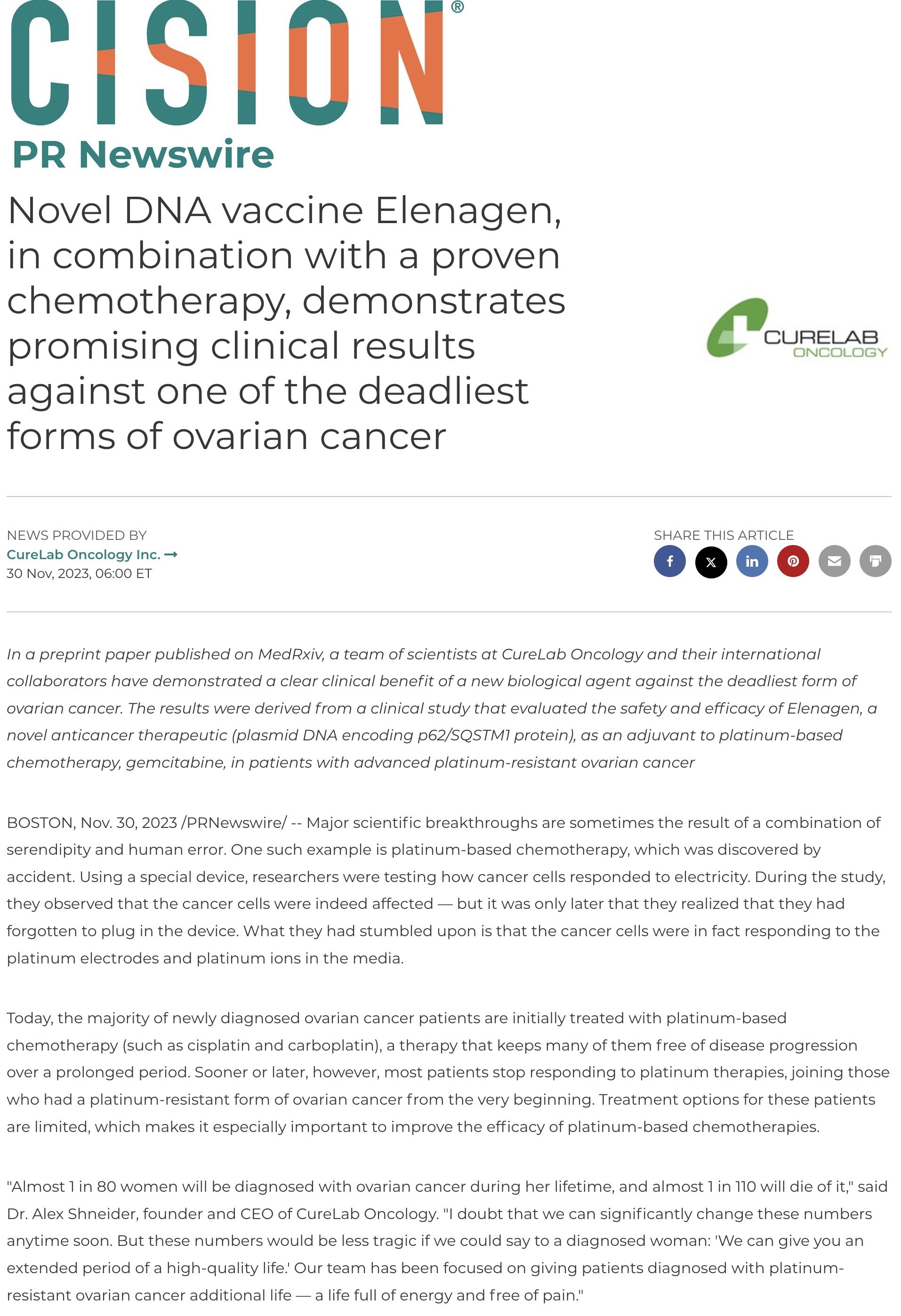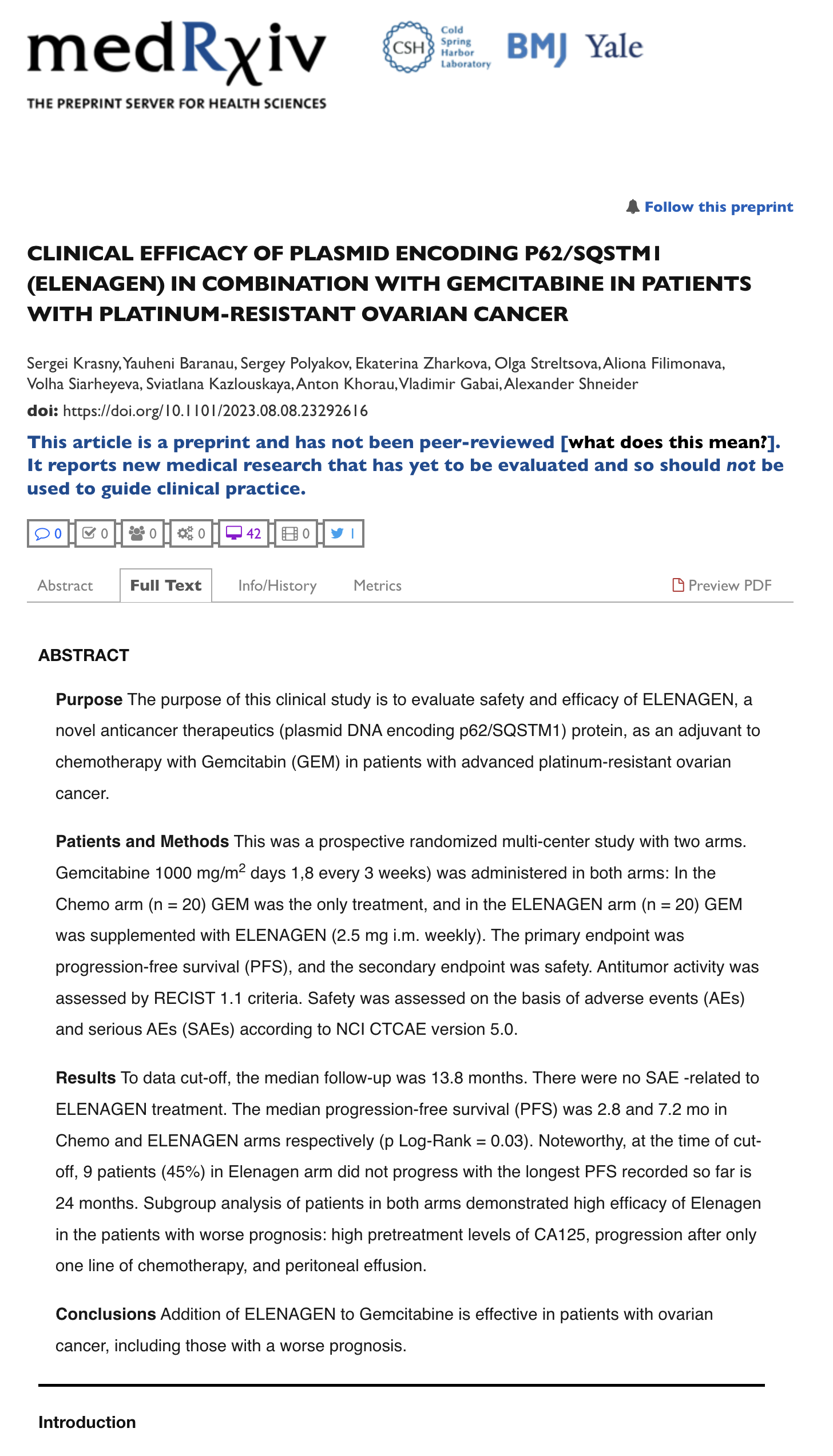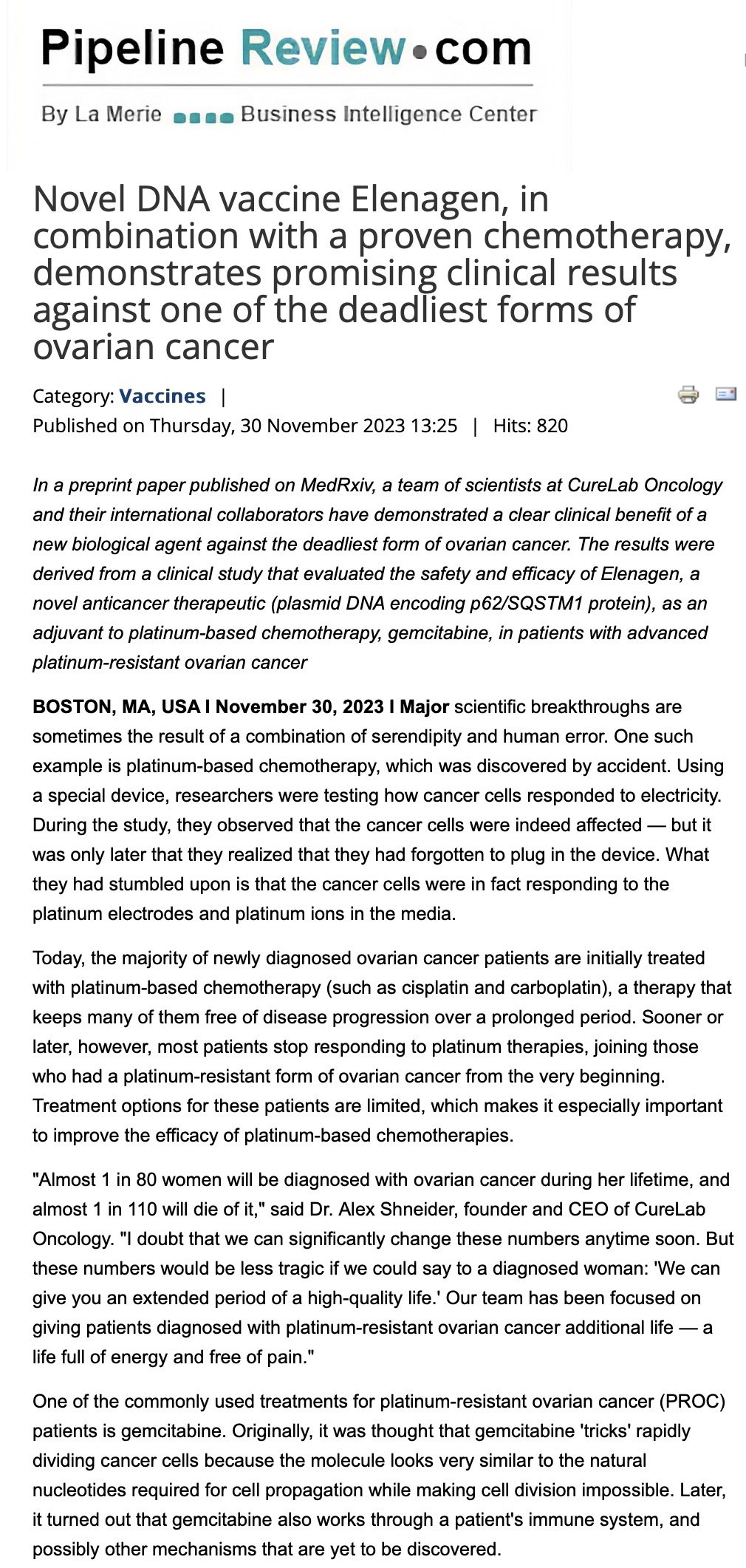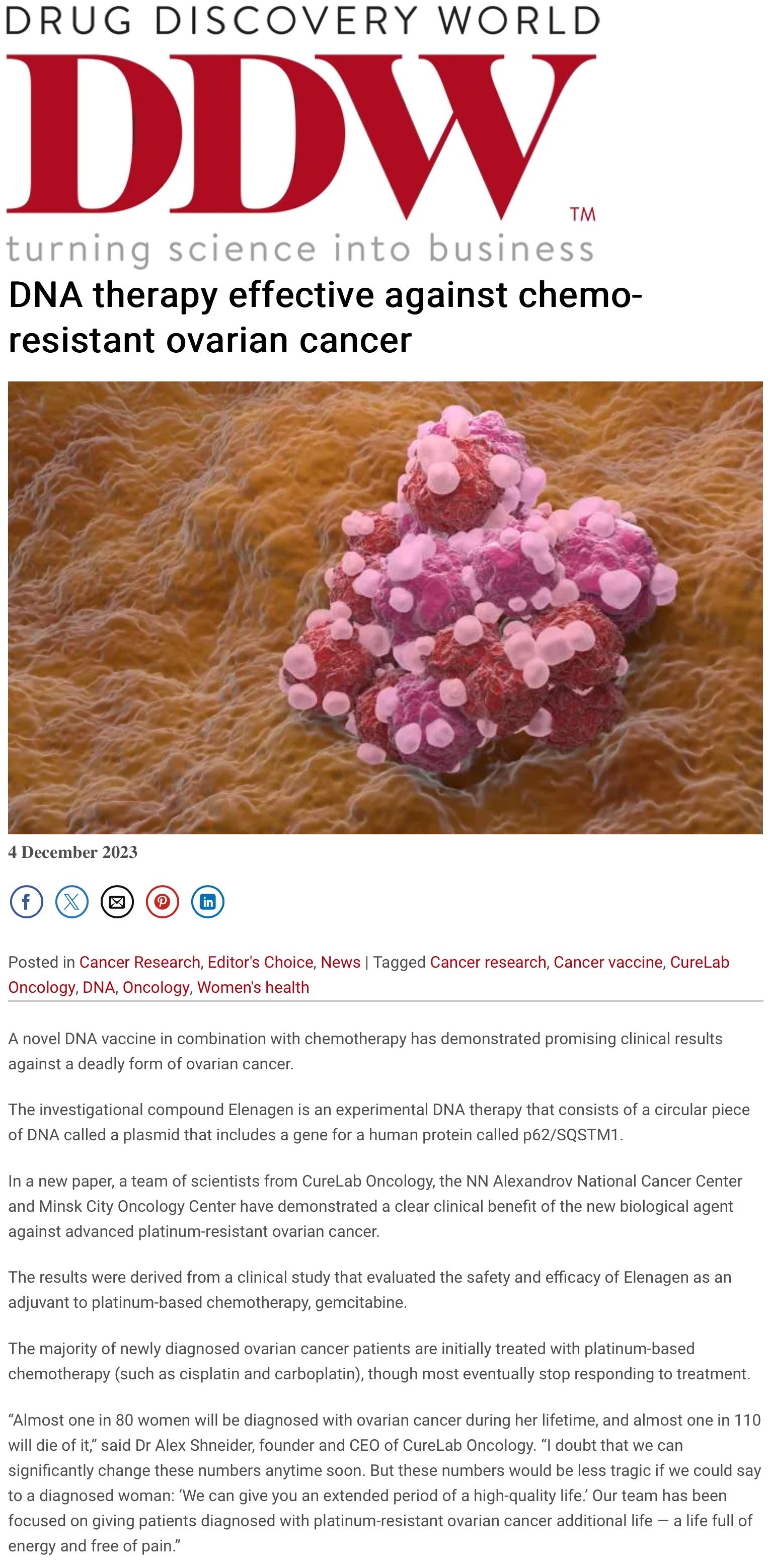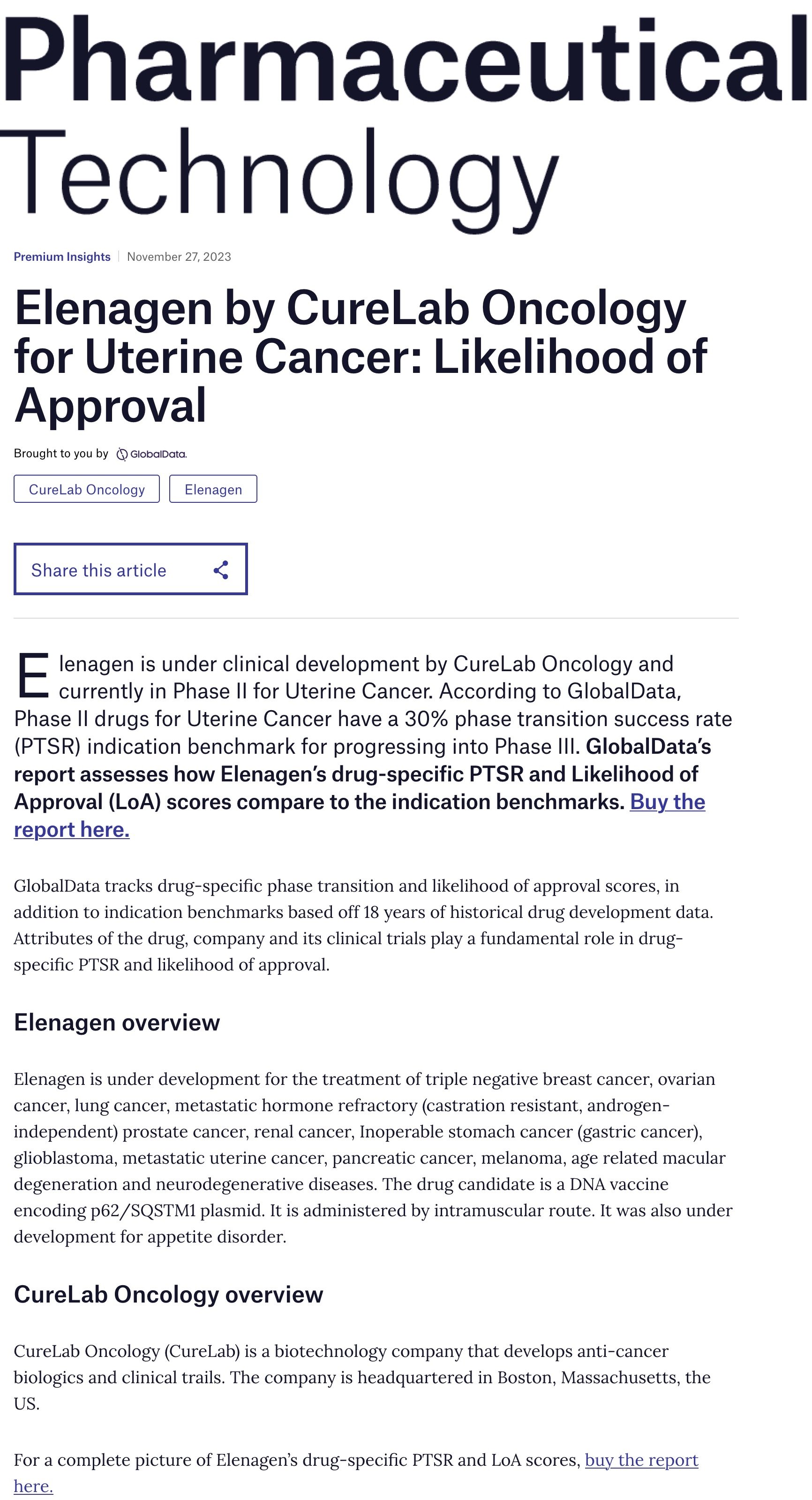CureLab's DNA vaccine prolongs the life of platinum-resistant ovarian cancer patients
"Almost 1 in 80 women will be diagnosed with ovarian cancer during her lifetime, and almost 1 in 110 will die of it," said Dr. Alex Shneider, founder and CEO of CureLab Oncology. "I doubt that we can significantly change these numbers anytime soon. But these numbers would be less tragic if we could say to a diagnosed woman: 'We can give you an extended period of a high-quality life.' Our team has been focused on giving patients diagnosed with platinum-resistant ovarian cancer additional life — a life full of energy and free of pain."
“Major scientific breakthroughs are sometimes the result of a combination of serendipity and human error.”
One such example is platinum-based chemotherapy, which was discovered by accident. Using a special device, researchers were testing how cancer cells responded to electricity. During the study, they observed that the cancer cells were indeed affected — but it was only later that they realized that they had forgotten to plug in the device!
What they had stumbled upon is that the cancer cells were in fact responding to the platinum electrodes and platinum ions in the media.
One of the commonly used treatments for platinum-resistant ovarian cancer (PROC) patients is gemcitabine. Originally, it was thought that gemcitabine 'tricks' rapidly dividing cancer cells because the molecule looks very similar to the natural nucleotides required for cell propagation while making cell division impossible. Later, it turned out that gemcitabine also works through a patient's immune system, and possibly other mechanisms that are yet to be discovered.
Today, the majority of newly diagnosed ovarian cancer patients are initially treated with platinum-based chemotherapy (such as cisplatin and carboplatin), a therapy that keeps many of them free of disease progression over a prolonged period. Sooner or later, however, most patients stop responding to platinum therapies, joining those who had a platinum-resistant form of ovarian cancer from the very beginning. Treatment options for these patients are limited, which makes it especially important to improve the efficacy of platinum-based chemotherapies.
In a study published on MedRxiv, a team of scientists from CureLab Oncology, the N.N. Alexandrov National Cancer Center, and Minsk City Oncology Center set out to establish whether an investigational new drug, Elenagen, can safely enhance gemcitabine PROC treatment.
CureLab’s therapeutic: Elenagen
Elenagen is a plasmid, a circular DNA that encodes a gene known as p62/SQSTM1 (p62). Originally, Dr. Shneider and his team decided to inject this plasmid into cancer patients because elevated levels of p62 were reported for cancer cells, distinguishing them from normal cells. Could injecting p62-encoding DNA into a muscle could result in a specific immune response against overly abundant p62, thereby selectively eliminating cancer cells? In other words, a classic vaccine mechanism of action.
However, to their great surprise, CureLab researchers and their academic collaborators observed Elenagen effects that could not be explained solely by their original hypothesis. For example, in response to an intramuscular injection of Elenagen, tumors changed their internal structure, permitting immune cells to enter the tumors more efficiently while making it harder for metastatic cells to exit. Importantly, Elenagen also reduced systemic chronic inflammation in the organism. Chronic inflammation plays a detrimental role in many diseases, including cancer.
"When we began our study, we were concerned that the mechanism of action of this novel drug is not clear," said co-author of the study, Professor Sergey Krasny, M.D., Ph.D., Sc.D. "In fact, it may be years or even decades before it is entirely understood. Then we thought, what if our predecessors had waited for the mechanism of action of penicillin to be entirely clear in the lab before testing in the clinic? We were also compelled by the strong published evidence of Elenagen's effects obtained during Phase I clinical studies and in laboratory dogs."
Promising results in ex-US study
In a clinical trial, 40 PROC patients were randomly divided into two groups. One received standard gemcitabine regimen while another received a combination of the same gemcitabine treatment coupled with weekly injections of Elenagen. No serious adverse events (SAE) due to Elenagen were reported. Note: SAE have often observed during immune oncology studies, which sets Elenagen apart. In addition to safety, the study used the standard primary endpoint of progression-free survival (PFS). PFS is the duration of time between the moment when a patient is enrolled in a study and the moment of relapse of a primary tumor and/or metastatic lesions, as confirmed by radiographic scans.
As in other published reports, the average PFS for gemcitabine-treated group was just 2.8 months. However, the group receiving the chemotherapy supplemented with Elenagen demonstrated a PFS of 7.2 months, a statistically significant increase. Importantly, 9 out of 20 patients receiving Elenagen did not demonstrate any disease progression, with a longest recorded observation of 24 months. At the same time, all patients receiving only the chemotherapy had disease progression within less than one year.
Although the fact that 45% of patients in the Elenagen-treated group did not show a disease progression is itself remarkable, additional truly counterintuitive data appeared through a subgroup analysis. CA 125 is a protein circulating in blood and is used by oncologists as an ovarian oncomarker. The higher the level of CA 125, the worse the prognosis. One might expect that Elenagen + gemcitabine treatment would show reduced benefits for patients with elevated CA 125, since their disease is more severe and is thus harder to treat. However, compared to the control group, the patients with elevated CA 125 patients were the most responsive to Elenagen regimens.
Another prognosis factor for a patient is the number of platinum chemotherapy courses received prior to becoming platinum resistant. Indeed, if disease progresses after just one course of platinum treatment, it is often more severe and harder to treat than in cases where the patient remains progression-free over multiple courses. Also of note: the most obvious effect of Elenagen treatment was observed in patients whose disease progressed after just one course of platinum chemotherapy.
Encouraged by these ex-US results, CureLab Oncology has submitted its pre-IND package to the FDA. The company plans to expand the study in the USA as Phase II/III study. The principal investigator for the study will be Prof. Bhavana Pothuri, MD of NYU. The same combination of Elenagen with gemcitabine will be explored. Meanwhile, non-pivotal studies will continue abroad to test if Elenagen also enhances anti-PROC effects of paclitaxel, doxil, and other treatments.
Publicizing the results
To provide immediate access to the new findings from the study in Belarus, we published a paper on the MedRxiv preprint server. Once this was live, we developed a press release that provides important context and promotes the paper. This press release was then used as the core content for media outreach to a curated list of top biotech, pharma, and oncology journalists.
Already, we have secured several published stories and secured interviews for Alex on influential podcasts.




